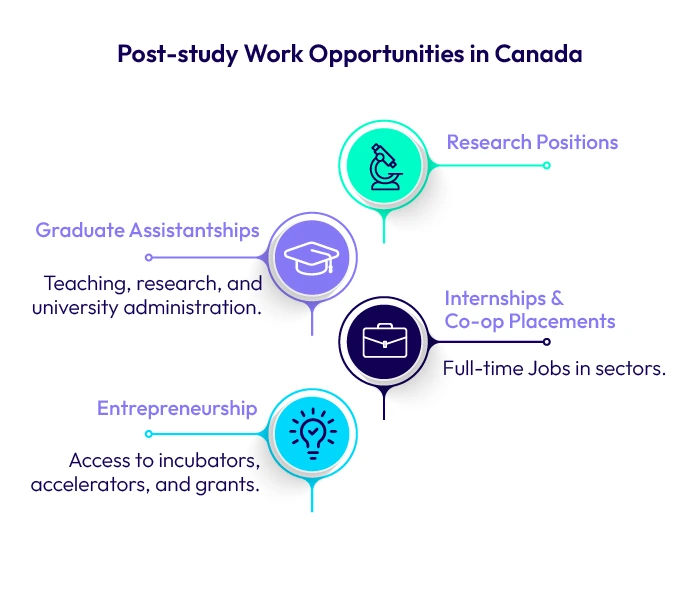Explore Top Diploma Courses in Canada
Learn everything you need to know about studying Diploma courses
in Canada and get end-to-end expert guidance from us.

Explore Top Diploma Courses in Canada
Learn everything you need to know about studying Diploma courses in Canada and get end-to-end expert guidance from us.

Diploma in Canada for Indian Students
Diploma courses in Canada are aimed at assisting students to increase their skills and improve their academic performance. Canadian diploma programs seek to provide a holistic learning and educational approach with both theoretical knowledge and practical skill sets.
In case you want to study business, healthcare, IT, art, or some other field, there are several diploma programs in Canada for you. These qualifications contribute to personal accomplishment as well as professional development. These programs for local and international students have the approval of the global education community, thus making Canada a popular destination for professional education.
Benefits of Diploma Courses in Canada
Most Indian students in particular prefer diploma programs over other degree courses because they cost less and take less time to complete.
Furthermore, there are several other advantages that Indians receive upon their enrollment into diploma courses in Canada:
- With the exception of some engineering programs that can take up to three years, 2-year diploma courses in Canada for international students are shorter and can be finished in a maximum of two years. Completing other degree programs in Canada might take up to four years.
- Diploma programs emphasize training and practical aspects above academic ones and are job-oriented.
- These 2-year diploma programs start as low as 13,000 CAD annually, making them quite inexpensive. Conversely, degree programs are more expensive to attend and often cost between $18,000 a year.
- Short courses are accepted for a variety of job prospects and are valid across Canada.
- In Canada, students participating in courses lasting eight months or more are eligible to apply for a Post-Graduate Work Permit (PGWP). PGWP is open to diploma courses in Canada for international students.
Types of Diploma Courses in Canada
The internationally acclaimed Canadian education system offers specialist diplomas in several fields. Most diploma programs are designed to help students quickly grasp fundamental concepts in their area, allowing them to start working sooner.
There are two types of Canadian degrees.
Undergraduate Diploma
Postgraduate Diploma
Undergraduate Diplomas:
Regular UG Diploma Courses in Canada (Two Years): This kind of diploma, with its specialisation in a certain academic domain, generally requires an intensive study of various relevant courses.
Three-year Advanced UG Diploma Courses in Canada: Here you can refine your knowledge and apply it to practice through internships that give a real-life view of the chosen field of study.
Students can get different diploma degrees specializing in different subjects mentioned below:
Media Technology
Fashion Design
Interior Design
Engineering
Information Technology
Management
Hotel Management
Accounting
Pharmacy
Postgraduate Diplomas:
Those who would like to advance their professional endeavors and hone their job positions will find the chance to enroll in a specialized postgraduate diploma in Canada interesting.
Particularly noteworthy programs include:
Postgraduate Diploma in Finance: This course costs around CAD 25,000 and includes a wide range of subjects related to financial management and analysis.
Diploma in Marketing: This program, which costs CAD 16,000 and lasts for two semesters, is particularly significant because it equips students with fundamental marketing knowledge and abilities.
HR PG Diploma: The course has a market value of CAD 15,500 and was created with an emphasis on human resource management ideas and techniques.
Diploma in Business Analytics: This costs roughly CAD 15,000 and examines data management and business intelligence operations.
Postgraduate Diploma in International Business: This course costs about CAD 16,600. It applies the theory of global trade and management to actual business situations in addition to offering a theoretical overview of the subject.
Diploma in Supply Chain Management: The logistics component of supply chain optimization is included in this course, which costs roughly CAD 17,500.
Project Management and Accounting Diplomas: These courses cover both project management and accounting concepts and cost CAD 19,000 each.
Postgraduate Diploma in Data Science: This program, which is offered by the University of Calgary, costs CAD 61,000. Advanced training in AI and machine learning is usually part of the program.
Canadian Nursing Postgraduate Diploma: Students who pay the CAD 16,000 course fee will receive the training necessary to succeed in the country's healthcare system.
Depending on the field of work and degree of specialization, graduates can reasonably be expected to earn an annual income between CAD 35,000 and CAD 90,000 upon graduation.
Cost of Studying Diploma Courses in Canada for Indian Students
When it comes to living expenses in Canada, the estimated monthly total is 70,000 to 90,000 INR, not excluding educational costs. Apart from tuition, housing is a significant portion of the cost of living in Canada.
Here is a summary of the costs related to studying:
|
Category |
Cost Range(INR) |
|
Tuition Fee |
4 - 7.50 Lakhs per year |
|
Accommodation |
20 - 70 thousand per year |
|
Cost of living |
5 - 7.50 Lakhs per year |
|
Duration |
1-3 years |
Top Canadian Institutions Offering Diploma Courses
Here's a glimpse into some top Canadian institutions renowned for their diploma programs:
College | Information |
Seneca College | Seneca offers a wide variety of comprehensive diploma programs in Toronto, including business, technical, and media arts. |
Centennial College | Full-time diploma programs in hotel administration, engineering, and social services are offered at the Toronto campus. |
Sheridan College | Offers world-class programs and has outstanding professors in fields ranging from creative studies to digital innovation. |
The British Columbia Institute of Technology, BCIT | The vocational training program offers engineering, trade, manufacturing, and technology credentials. |
Humber College | The college offers Business, Health Care, and Creative Arts diplomas to full-time Toronto residents. |
Eligibility Criteria for Diploma Courses in Canada
Applicants to diploma programs in Canada must meet some of the stated prerequisites, including submitting the required paperwork.
- Enrollment in a Designated Learning Institute (DLI): In this regard, it will be expected of all candidates applying for this program to attend classes while residing in a Canadian DLI that has been granted permission.
- Financial Capability: It should be made plain that you should have had sufficient money saved up to invest in lodging for the night, pay for your tuition, and purchase a return ticket. One is always required to demonstrate that his financial situation is enough because one can never predict when this occurrence will occur.
- Legal Compliance: If a person is found guilty of breaking Canadian law or has a criminal record while residing in the nation, they will either be refused entry into Canada or deported. For example, in some circumstances, the police certificate may be relevant.
- Good Health: Test takers are expected to be in good health for this exam, and they must show up for it even if they don't have access to medical facilities.
- Intent to Leave: Graduates must be able to explain to officials their plans to depart as well as the trade-offs usually involved in immigration.
Important documents:
- Financial Support Evidence: The participant's ability to determine how to cover costs will be demonstrated by the record.
- Identity Proof: For many citizens, obtaining an actual passport—which can be used to establish identity—has been an arduous and drawn-out procedure.
A justification letter is a document in which a prospective student composes a strong essay outlining their rationale for selecting the university and the particular program.
Standardized Examinations:
- GMAT: The exam assesses a candidate's verbal, arithmetic, and reasoning skills and is frequently required for admission into MBA programs and business-related courses.
- GRE: Colleges frequently view the GRE as a prerequisite for enrollment in MA or MS programs.
- LSAT: A state exam that measures test-takers reading and speaking skills is administered to law students.
- Exams to measure fluency in English:
- TOEFL: Assesses language proficiency, particularly among non-native speakers, ideally before enrolling in a course.
- IELTS: One of the most well-liked examinations, which assesses speaking, listening, reading, and writing abilities for three different reasons: immigration, scholarship, and education.
- PTE: Widely used in Canadian academic settings, this computer-based test evaluates language competency in a variety of domains.
- CAEL: This assessment level is specifically designed to gauge students' English communication abilities in Canadian classrooms.
Scholarships to Study Diploma Courses in Canada
|
Scholarship |
Eligibility Criteria |
Awards |
|
Canada-India Acceleration Program (CIAP) |
Indian nationals wishing to enroll in Diploma Programs in Canada |
Opportunities for networking, mentorship, and grants up to CAD 20,000 |
|
Vanier Canada Graduate Scholarships |
Indian citizens pursuing certificate education in Canada |
CAD 50,000 annually for up to 3 years |
|
Ontario Trillium Scholarship (OTS) |
Indian students enrolled in Ontario diploma courses |
CAD 5,000-CAD 40,000 annually |
|
University of Toronto International Scholar Award (UTIAS) |
Indian students pursuing Diploma Programs in Canada |
CAD 10,000 to CAD 20,000 annually |
|
Humber International Entrance Scholarships |
Indian students enrolling in Ontario Humber College diploma programs |
CAD 1,000 to CAD 4,000. |
|
Centennial College Entrance Scholarships for Indian Students |
Indian diploma applicants at Centennial College, Ontario |
Up to CAD 5,000 |
|
York University International Students Scholarships |
Indian students seeking diplomas at York University, Ontario |
Ranges from CAD 2,000 to 35,000 |
|
Dalhousie University Scholarships for Indian Students |
Indian students pursuing diplomas at Dalhousie University, Nova Scotia |
CAD 10,000 to CAD 30,000 |
|
University of British Columbia (UBC) International Leader of Tomorrow Award |
Honors Indian students pursuing diploma programs in Canada with exceptional academic performance |
Fully funded tuition, living stipend |
Post-study Work Opportunities in Canada
After getting a university degree in Canada, you will have a lot of opportunities in the job market in different sectors. A basic overview:
Research Positions: Most colleges, research centers in Canada and other research organizations have advanced postgraduate programs that focus more on applied science. These posts also allow students to develop their industrial links and gain practical experience from the applied research they undertake during this period.
Internships and Co-op Placements: Collaboration with industry is a key tenet of Canadian colleges’ ideology. So they provide opportunities for internships and part-time jobs. These roles allow students to apply the skills they acquire in class to real-life situations, often leading to full-time employment after graduating.
Graduate Assistantships: These help learners who obtain degrees to begin teaching, carry out research, as well as run various university departments. This guarantees financial stability as well as initial scholarly publications.
Entrepreneurship: Some amazing start-ups found their niche either in Toronto, Montreal, or Vancouver. In particular, post-diploma students can benefit from incubators, accelerators, or grants that may help them launch their businesses.
Work Permit Options: Upon completion of post-diploma courses in Canada, international students may qualify themselves for work permits which allow them to gain practical experience.

Takeaway
Integrating employability and skills-based practice, diploma programs in Canada can offer students an affordable and fast path to success. Diploma programs help students land good jobs in Canada's competitive labor market while learning new skills. Canada's friendly culture and global reputation make it the finest place for top-tier education and job success.
Students can access a wealth of knowledge and skills through AECC's online courses, preparing them to succeed in various job roles in their future career. As a result, AECC is devoted to providing the upcoming generation with a well-rounded education that utilizes both theoretical knowledge and practical experience.
Contact AECC today to ensure your bright future with Diploma in Canada!

